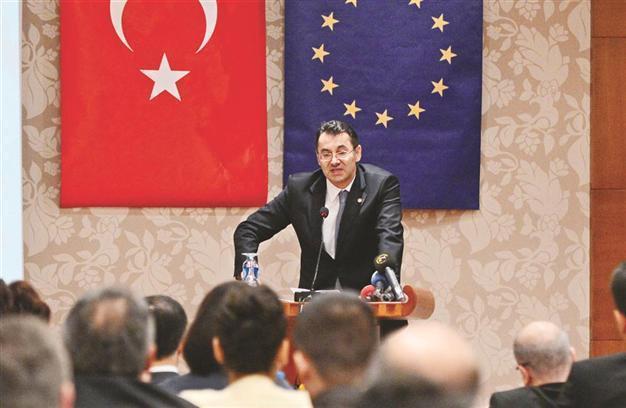Pressure on press hinders democracy, says top judge
ANKARA

The deputy chief of the Constitutional Court, Alparslan Altan, is seen speaking at a workshop about freedom of expression in social media. AA photo
A top judge has maintained the main reason behind the rise of social media has been classical media organs’ indifference to the real problems of society and the individual.Speaking at a workshop about freedom of expression in social media, the deputy chief of the Constitutional Court, Alparslan Altan, also touched upon the government’s efforts to manipulate the media, either through commercial or political motives.
Altan, delivering a speech at the “Workshop on Freedom of Expression in Media within the Framework of the European Convention on Human Rights,” held yesterday, underlined the media’s role in shaping public opinion vis-à-vis its function of auditing and restricting political power.
“Particularly, the cartelization in media; attempts to silence media for commercial or political purposes and the political powers’ efforts to take hold of the media and silence and paralyze it are increasing the media’s importance in freedom in regard to a democratic system. Actually, the most important reason for the strengthening of individual and collective freedom of expression in social media is the fact that classical media expresses indifference to the individual and society’s real problems, due to the cited commercial, political and ethical reasons and their failure to meet society’s need to express itself,” Altan was quoted as saying by Anadolu Agency.
During the Gezi Park unrest, which kicked off in late May and expanded over the entire summer, protesters turned websites like Twitter and Facebook into tools for organizing protests, voicing mostly anti-government sentiments.
The frequency and intensity of the Gezi Park protests on social media reached levels so high it prompted Turkish Prime Minister Recep Tayyip Erdoğan to personally intervene, calling Twitter “a menace” and beginning a campaign against the website.
Many protesters were detained during the protests over their social media postings, with the online giant Facebook admitting to sharing information with Turkish police forces, despite previously denying the accusations.
According to Altan, media institutions are expected to serve for the improvement and the settlement of democratic, transparent and accountable governance so that the democratic system can function healthily.
“However, when it is looked at in practice, we frequently see the media’s freedom is being misused with the cited purposes as well. The same situation is also valid for those who use social media,” Altan said at the workshop, which was hosted by the Office of the Chief Prosecutor of the Supreme Court of Appeals.
Bela Szombati, deputy head of the delegation of the European Union to Turkey, also delivered a speech at the workshop, urging Turkish judicial authorities to use the case-laws of the European Court of Human Rights as a guide in their rulings concerning freedom of expression.
In September, in a letter sent to Erdoğan, the Committee to Protect Journalists (CPJ), an international press freedom advocacy group, voiced concerns over the “continued press freedom crisis” in Turkey.
The letter also slammed the government’s threats to restrict social media.
The CPJ letter referred to the Twitter campaign launched by Ankara Mayor Melih Gökçek defaming a BBC journalist, Selin Girit, as an English spy. Girit received “a large number of threatening messages” in response to the mayor’s actions, the letter quoted a BBC statement drawing attention on the issue.
















